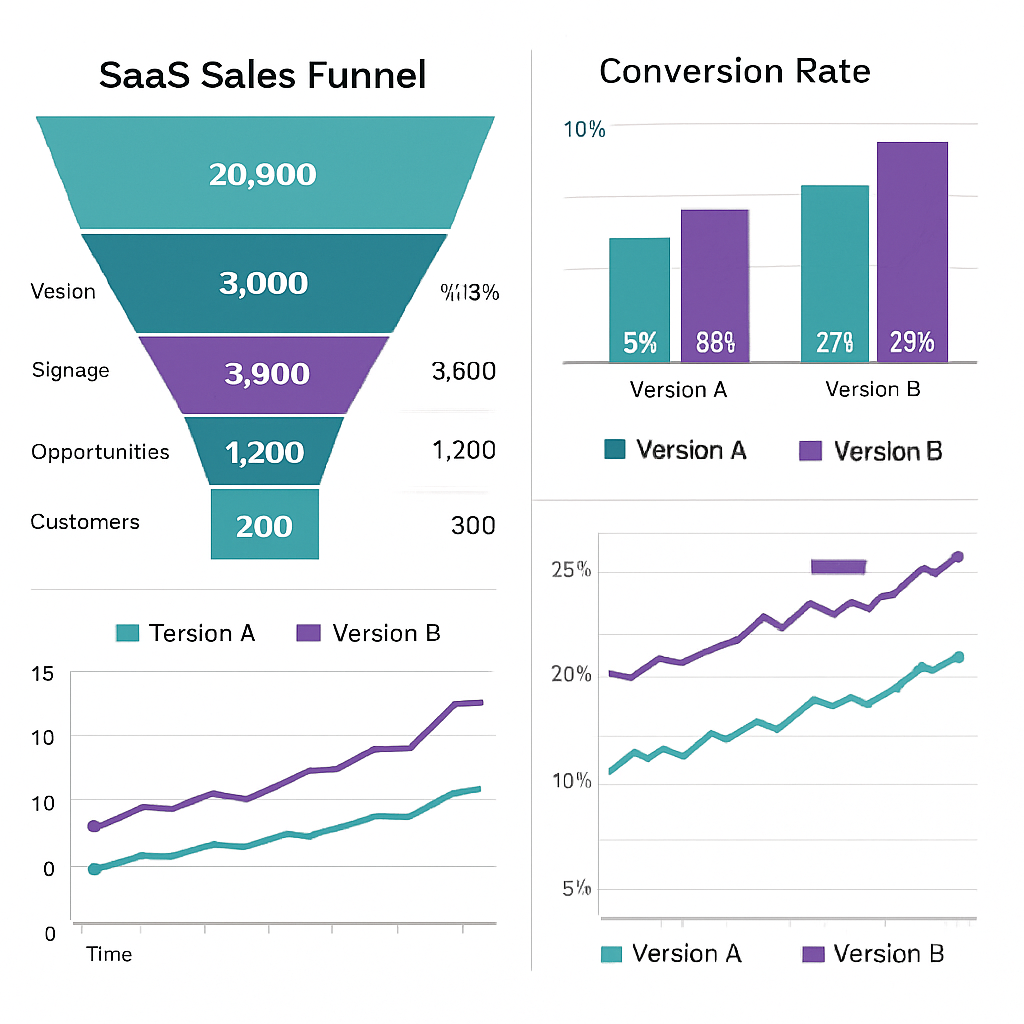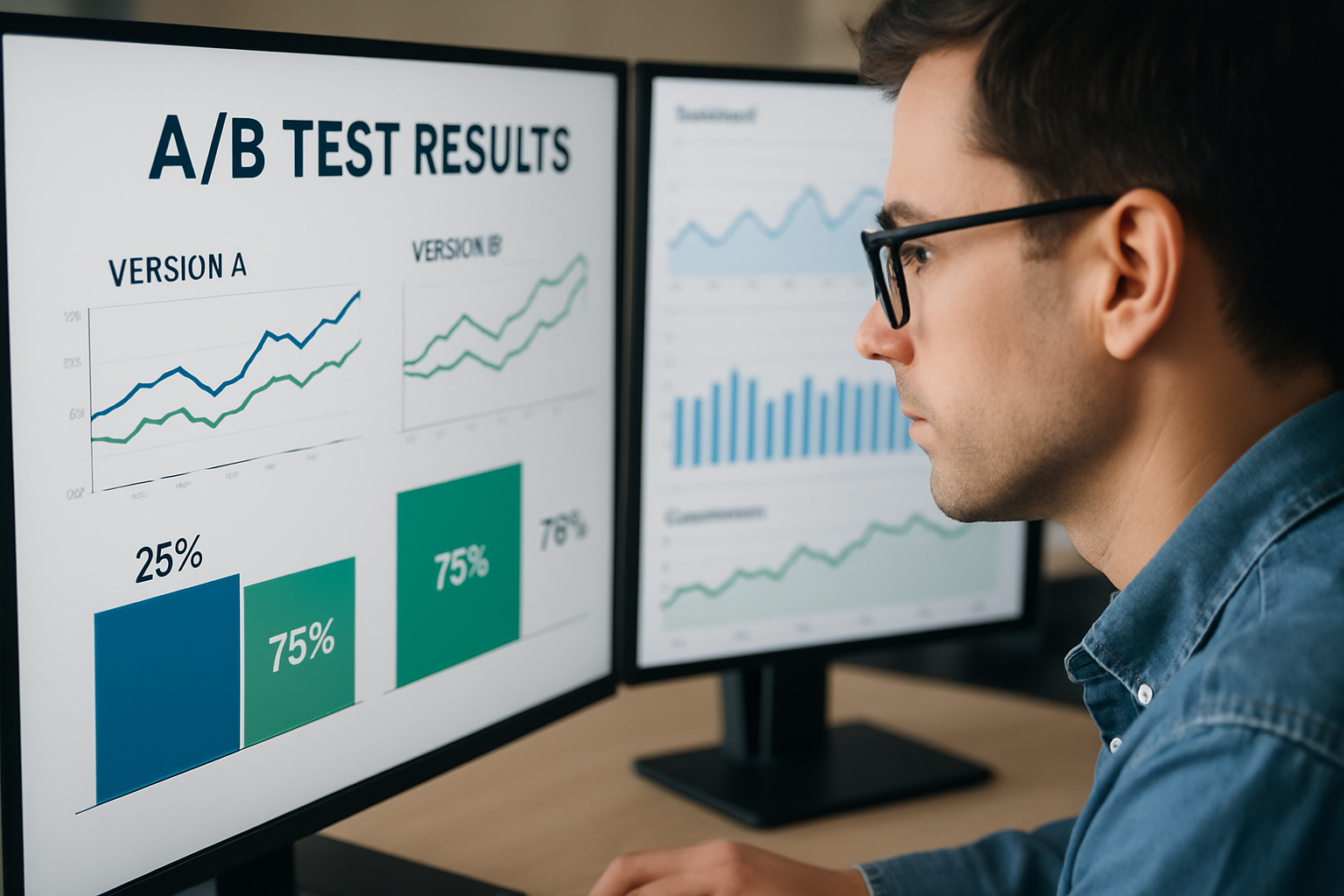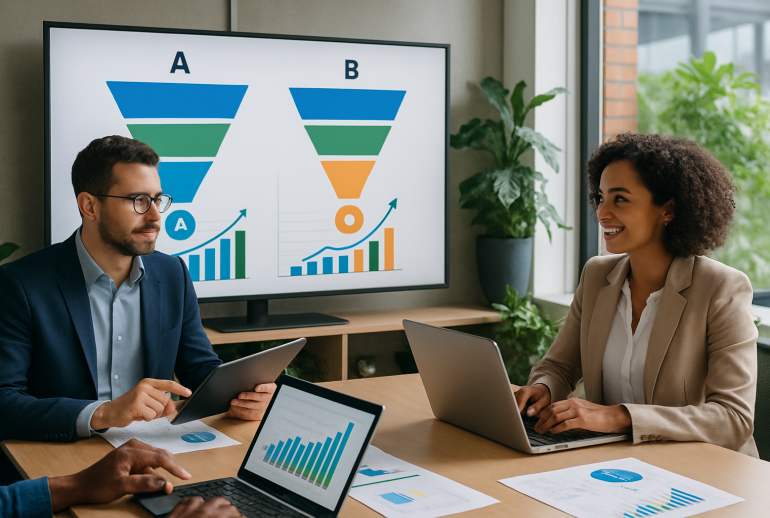The competitive landscape of Software as a Service (SaaS) in 2025 demands relentless optimization of the sales funnel to capture and retain customers effectively. Businesses observe fluctuations in conversion rates that directly impact their revenue streams. An emerging beacon in this field is A/B testing—a methodical approach to experimenting with different marketing elements to pinpoint what truly resonates with your audience. Employing robust A/B testing platforms such as Optimizely, Google Optimize, and VWO, companies can transform assumptions into data-driven insights, refining user experiences and boosting conversion rates.
In SaaS, the sales funnel stretches across multiple touchpoints—from initial awareness fostered by persuasive email marketing campaigns (with strategies highlighted in email marketing insights) to the final purchase or subscription action on your landing pages. Tools like HubSpot and Adobe Target integrate seamlessly to administer these tests, streamlining the process of modifying call-to-action buttons, headlines, or pricing page layouts while tracking user engagement critically. The secret lies not only in what you present but how you present it, supported by continuous iterative improvements, which is the essence of successful A/B testing.
This article explores the multifaceted benefits of A/B testing tailored for SaaS sales funnels. We delve into practical applications, the underlying mechanics of conversion rate optimization, and how companies can harness this technique using advanced analytics and experimentation platforms like Mixpanel and Crazy Egg. Dive in to understand how testing hypotheses backed by user data not only drives higher conversions but improves customer lifetime value (LTV), ultimately sustaining growth in an ever-evolving SaaS marketplace.
Understanding Conversion Rate Optimization Through A/B Testing in SaaS Sales Funnels
Conversion rate optimization (CRO) critically influences the success of any SaaS business, serving as a direct indicator of how effectively your website or application converts visitors into paying customers or qualified leads. The conversion rate quantifies the proportion of users who complete a desired action, be it signing up for a free trial, submitting a form, or finalizing a purchase.
One of the most common pitfalls in SaaS conversion arises from neglecting to analyze user behavior adequately. Without data, businesses rely on guesses that may miss key barriers or friction points in the user journey. Utilizing tools such as Kissmetrics and Crazy Egg can reveal behavioral analytics like heat maps and session recordings, pinpointing where visitors drop off or hesitate.
A/B testing is a focused method to systematically compare an original version of a sales funnel element (Version A) against a variant (Version B) to determine which version performs better. For example, you might test two different headlines on a pricing page using Google Optimize, tracking which headline better captures attention and drives users to commit. These experiments typically involve changing one element at a time to isolate impact rigorously, but progressive methodologies may test multiple changes simultaneously when using sophisticated platforms like Optimizely.
The following list details elements within a SaaS sales funnel ripe for A/B testing:
- Landing page headlines emphasizing different value propositions
- Call-to-action (CTA) button text, size, color, and placement
- Pricing structure presentation and tier details
- Form length and fields on sign-up or lead capture pages
- Visual assets, including hero images and explainer videos
- Navigation menus, to streamline user flow and minimize distractions
| Element | Typical Variant | Expected Impact | Recommended Tool |
|---|---|---|---|
| Headline | Clear value vs. emotional appeal | Improved engagement, reduced bounce rate | Google Optimize, VWO |
| CTA Button | “Free Trial” vs. “View Demo” | Higher click-through rate, increased sign-ups | Optimizely, Unbounce |
| Pricing Page | Tiered vs. flat pricing display | Better user comprehension, improved conversions | Adobe Target, HubSpot |
| Signup Forms | Short vs. detailed fields | Higher form completion rate | Crazy Egg, Mixpanel |
The landing page serves as a critical juncture where visitors decide whether to proceed. Testing these elements systematically provides actionable insights that preserve acquisition flows and minimize user abandonment, ensuring that every interaction nudges prospects closer to conversion.

Leveraging A/B Testing to Increase Customer Lifetime Value and Reduce Churn
Beyond initial conversions, the sustainability and profitability of a SaaS business hinge on customer lifetime value (LTV) and churn reduction. LTV measures the net profit a customer contributes over their entire engagement. SaaS companies that excel in maintaining and increasing LTV often outperform competitors by delivering consistent value, fostering trust, and engaging users effectively after onboarding.
The relationship between LTV and churn is delicate. High churn not only diminishes revenue but undermines growth investments. Effective A/B testing targets critical points where customers disengage, such as onboarding sequences, feature adoption flows, or renewal prompts.
Enhancing LTV through A/B testing involves:
- Optimizing onboarding flows by testing welcome messages, tutorials, and in-app prompts to increase initial engagement
- Testing personalized pricing and upsell offers presented at strategic moments during usage
- Experimenting with email campaigns to nurture users, reduce churn, and encourage upgrades, utilizing platforms like HubSpot or Sentient Ascend
- Evaluating in-app messaging and product feature announcements to drive feature adoption and perceived value
For instance, one SaaS company improved retention by 20% after A/B testing two onboarding email sequences with varied messaging styles—one emphasizing benefits, the other highlighting how to get started quickly. Likewise, a series of tests on upgrade prompts, using Clear and compelling CTAs versus subtle suggestions, revealed that straightforward language increased upsell conversion rates dramatically.
| Test Area | Variation | Effect | Tools Used |
|---|---|---|---|
| Onboarding Emails | Benefit-focused vs. how-to approach | 20% increase in retention | HubSpot, VWO |
| Upsell CTAs | Clear, direct vs. subtle suggestions | 30% higher upsell conversion | Optimizely, Adobe Target |
| In-app Messages | Personalized vs. generic prompts | 25% boost in feature adoption | Sentient Ascend, Mixpanel |
Ultimately, A/B testing empowers SaaS vendors to refine their customer experience, translating into higher LTV and lower customer acquisition cost (CAC), which aligns with the ideal LTV to CAC ratio of 3:1. This balance is critical to ensuring sustained profitability and funding growth initiatives.
Practical A/B Tests to Enhance Your SaaS Sales Funnel Conversion Rates
For SaaS companies aiming to drive significantly better conversion results, targeted A/B testing experiments on key sales funnel components have proven invaluable. Below are ten practical examples of tests that can yield measurable improvements, many of which integrate popular tools such as Unbounce for landing page variations and Crazy Egg for user behavior insights.
1. Headline variants: Test short, benefit-focused headlines against longer, detailed versions to find what clicks.
2. CTA button text and color: Variations like “Start Free Trial” versus “Request Demo” or button colors blue versus orange can alter user interaction.
3. Form length adjustments: Try concise sign-up forms against more detailed questionnaires to balance lead quality with completion rates.
4. FAQ section placement and visibility: Assess if positioning FAQs above or below the fold affects bounce rate and user confidence.
5. Countdown timers: Use urgency-based timers for offers and evaluate their effect on conversion and churn.
6. Video content: A/B test explainer and testimonial videos to analyze trust-building and engagement levels.
7. Chatbot availability: Experiment with chatbot presence to see if real-time interaction increases lead capture.
8. Cardless free trials versus trials requiring credit cards: Test sign-up friction points to optimize trial-to-paid conversion rates.
9. Social proof elements: Include testimonials, user counts, or media logos in various formats to see which confidence boosters convert better.
10. Navigation menu variations: Horizontal vs. vertical or simplified navigation schemes can help reduce drop-offs.
| Test | Description | Expected Outcome | Recommended Tool |
|---|---|---|---|
| Headline Variants | Benefit vs. emotional appeal headlines | Increased page engagement | Unbounce, Google Optimize |
| CTA Button Text & Color | Test “Start Trial” vs. “View Demo”, blue vs. orange | Higher CTA clicks | Optimizely, VWO |
| Form Length | Concise vs. extended fields | Optimized form completions | Crazy Egg, Mixpanel |
| Countdown Timers | Urgency-driven timers on promotions | Boosted conversions | Adobe Target, HubSpot |
Alongside implementation, continuously measuring key performance indicators such as CTR, bounce rate, average session duration, and conversion rate provides feedback to guide further tests. For deeper insights, analytics tutorials focus on SaaS sales funnels add context and actionable best practices.

How Advanced A/B Testing Tools Revolutionize SaaS Sales Funnel Optimization
The SaaS industry’s sophistication requires advanced testing platforms capable of nuanced experimentation with robust statistical analysis capabilities. Tools like Optimizely, VWO, and Sentient Ascend have become indispensable for many marketers looking to optimize sales funnels efficiently and with confidence.
Modern features of these platforms include:
- Multi-page funnel testing: Test sequences of pages to understand holistic user journeys across the site.
- Segmented user targeting: Deliver different experiences based on user demographics or behavior, enabling personalized funnels.
- Real-time analytics dashboards: Monitor test performance live to quickly pivot strategies.
- Integration with CRMs and analytics: Connect with HubSpot, Kissmetrics, or Mixpanel for richer data synchronization.
- Automated statistical significance thresholds: Ensure test results are trustworthy before implementation.
These capabilities do more than just run tests; they support a culture of continuous improvement and data-driven decision-making. For example, SaaS vendors can easily segment new users to test onboarding variations separately from returning customers, maximizing both acquisition and retention simultaneously.
By incorporating AI-powered optimization available through platforms like Sentient Ascend, companies edge closer to predictive modeling—anticipating user responses and recommending proactive funnel adjustments in real-time.
| Tool | Key Feature | Best Use Case | Integration Support |
|---|---|---|---|
| Optimizely | Multi-page funnel testing, personalization | Complex SaaS sales funnel optimization | HubSpot, Kissmetrics, Mixpanel |
| VWO | Heatmaps, in-depth analytics | User behavior analysis and hypothesis generation | Google Analytics, HubSpot |
| Sentient Ascend | AI-powered decision making | Dynamic optimization of marketing content | Adobe Target, HubSpot |
SaaS businesses that harness these advanced tools gain significant competitive advantages, efficiently moving from guesswork to precision tuning, thereby maximizing revenue growth. For detailed guidance on crafting engaging content and optimizing every funnel stage, visit this content resource.
Strategic Implementation of A/B Testing in Your SaaS Sales Funnel for Maximum Impact
Implementing an effective A/B testing strategy within a SaaS sales funnel requires careful planning, precise execution, and ongoing refinement. Here’s a comprehensive checklist to ensure your testing program yields actionable insights and sustainable improvements:
- Define clear objectives: Identify which funnel metrics you want to improve (e.g., sign-up rate, trial conversion, revenue per visitor).
- Formulate hypotheses: Build assumptions grounded in analytics, heatmaps, and customer feedback.
- Segment your audience: Create test groups that reflect different customer personas for meaningful insights.
- Test one variable at a time: Unless using multivariate testing tools, isolate variables to attribute changes accurately.
- Set appropriate sample sizes: Ensure statistical significance by testing with adequate traffic volume.
- Monitor ongoing metrics: Track key statistics such as conversion rate, bounce rate, and session duration throughout the test.
- Analyze and iterate: Use data to reject or validate hypotheses, then plan subsequent tests based on learnings.
- Document results and share insights: Foster a culture of transparency and data-driven decision-making across teams.
Throughout this process, the utilization of cutting-edge experimentation platforms such as Unbounce for landing page variants or Adobe Target for enterprise-level personalization is highly recommended. Integrating customer support feedback and aligning with your company’s growth strategy strengthens the approach.
| Step | Details | Best Practices |
|---|---|---|
| Objective Setting | Define key KPIs for testing | Align with overall business goals |
| Hypothesis Formation | Leverage analytics & user feedback | Prioritize impactful changes |
| Audience Segmentation | Group by behavior, persona, or source | Ensure test validity |
| Testing Execution | Run tests with sufficient sample size | Isolate variables when possible |
| Analysis | Review performance data | Focus on statistically significant results |
| Iteration | Adjust strategies based on insights | Adopt a continuous improvement mindset |
Experimentation becomes a core capability that unlocks growth potential. To deepen understanding of funnel components, explore this complete guide to SaaS sales funnels, which complements your testing strategy with foundational knowledge.
Frequently Asked Questions About A/B Testing in SaaS Sales Funnels
- Q: Can A/B testing be applied effectively in low-traffic SaaS funnels?
A: While low traffic limits the statistical power of tests, combining qualitative user research with micro-testing on critical elements can still yield valuable insights. When traffic increases, larger-scale tests become viable.
- Q: How long should an A/B test run to obtain reliable results?
A: The duration depends on traffic volume and conversion event frequency. Tests should run until reaching statistical significance, which can range from days for high-traffic pages to weeks for slower flows.
- Q: Should all SaaS companies adopt A/B testing across their entire funnel?
A: Prioritizing tests in high-impact areas such as onboarding, pricing pages, and CTA elements is strategic. While comprehensive testing is ideal, resource constraints dictate focusing efforts where improvements can yield the greatest return.
- Q: How do I choose which A/B testing tool best suits my SaaS business?
A: Consider factors such as integration capabilities with your analytics stack, ease of use, feature set (e.g., multi-page testing, personalization), and budget. Solutions like Optimizely and VWO are popular for their robust offerings, while tools like Google Optimize offer accessible entry points.
- Q: Can A/B testing help improve customer retention as well as acquisition?
A: Absolutely. Testing messaging, feature announcements, and communications during onboarding and renewal phases can boost engagement and reduce churn, contributing directly to increased LTV.


